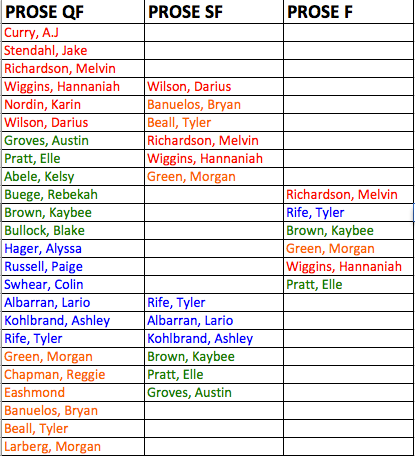We appreciate your interest in purchasing oral interp scripts from SpeechGeek Market! We know that state and national forensic organizations have different requirements for literature used in competition. In order to make your search for qualified scripts easier, we've compiled the following information.
VENDORS
There are four different publishers in SpeechGeek Market: SpeechGeek, Mushroom Cloud Press, Tibetan Treefrog Publishing, and the forthcoming (extra)ordinary, (un)usual series from author Pete Malicki.
ORDERING
Most scripts available in SpeechGeek Market are available in digital and print copies. The base price listed is a digital PDF copy of the script. Once you complete your online order, you will receive an e-mail confirmation from the store and a notification e-mail from FetchApp. The notification e-mail will contain a link that will take you to the page where you can download your file. The link will be active for two months or fifteen downloads, but we will be happy to reactivate your link should you need to re-download your purchase.
For a small fee, you can choose the "Digital + Print" option when ordering. Simply click the drop down menu to select this option.

Your print copy will ship within 48-72 hours of your order confirmation. At this time, there is no "Print Only" option for the scripts in our store.
DIGITAL SCRIPTS
Digital scripts from SpeechGeek and Mushroom Cloud Press are approved for competition by the National Speech and Debate Association. Your digital download will come with a username and password to access the digital copies. Please do not distribute this information to other people or programs, as it is intended for qualification verification purposes. If you should lose the information, just contact SpeechGeek Market with your order number.
DISTRIBUTION
When you purchase scripts from SpeechGeek Market, you're able to download the files to your computer and print copies as needed. Please do not post copies of the script on publicly accessible websites or servers. We have found that while some schools may have such servers available to staff and students, a quick internet search allows people free access to materials they haven't purchased. Preventing unauthorized distribution of scripts allows publishers to continue to create new content for folks to enjoy! have any questions, feel free to contact us.
ISBNs
Have no fear! The publication sold within the SpeechGeek Market contain ISBNs! Check the list below for the issue you may need.
MUSHROOM CLOUD PRESS
Clyde Hendrickson Vol. 1
ISBN 978-0-9844878-1-3
Clyde Hendrickson Vol. 2
ISBN 978-0-9844878-2-0
Drama Vol. 1
ISBN 978-0-9844878-6-8
Drama Vol. 2
ISBN 978-0-9844878-7-5
Humor Vol. 1
ISBN 978-0-9844878-3-7
Humor Vol. 2
ISBN 978-0-9844878-4-4
Humor Vol. 3
ISBN 978-0-9844878-5-1
Humor Vol. 4
ISBN 978-0-9844878-8-2
SPEECHGEEK
SpeechGeek Season One: Fall 2003
978-1-61387-000-6
SpeechGeek Season Two: Winter 2005
978-1-61387-002-0
SpeechGeek Season Three: Fall 2005
978-1-61387-004-4
SpeechGeek Season Three: Winter 2006
978-1-61387-005-1
SpeechGeek Season Three: Spring 2006
978-1-61387-006-8
SpeechGeek Season Four: Fall 2006
978-1-61387-008-2
SpeechGeek Season Four: Winter 2007
978-1-61387-009-9
SpeechGeek Season Four: Spring 2007
978-1-61387-010-5
SpeechGeek Season Four: Nationals 2007
978-1-61387-011-2
SpeechGeek Season Five: Fall 2007
978-1-61387-012-9
SpeechGeek Season Five: Winter 2008
978-1-61387-013-6
SpeechGeek Season Five: Spring 2008
978-1-61387-014-3
SpeechGeek Season Five: Nationals 2008
978-1-61387-015-0
SpeechGeek Season Five: Anniversary
978-1-61387-016-7
SpeechGeek Season Six: Fall 2008
978-1-61387-017-4
SpeechGeek Season Six: Winter 2009
978-1-61387-018-1
SpeechGeek Season Six: Spring 2009
978-1-61387-019-8
SpeechGeek Season Six: Nationals 2009
978-1-61387-020-4
SpeechGeek Season Seven: Fall 2009
978-1-61387-021-1
SpeechGeek Season Seven: Winter 2010
978-1-61387-022-8
SpeechGeek Season Seven: Spring 2010
978-1-61387-023-5
SpeechGeek Season Seven: Nationals 2010
978-1-61387-024-2
SpeechGeek Season Eight: Fall 2010
978-1-61387-025-9
SpeechGeek Season Eight: Winter 2011
978-1-61387-026-6
SpeechGeek Season Nine: Fall 2011
978-1-61387-027-3
SpeechGeek Season Nine: Winter 2012
978-1-61387-028-0
SpeechGeek Season Ten: Fall 2012
978-1-61387-038-9
SpeechGeek Season Ten: Winter 2013
978-1-61387-039-6
SpeechGeek Season Ten: Anniversary
978-1-61387-042-6
SpeechGeek Presents: Female/Female Duos, Vol. 1
978-1-61387-029-7
SpeechGeek Presents: Female/Female Duos, Vol. 2
978-1-61387-032-7
SpeechGeek Presents: Female/Female Duos, Vol. 3
978-1-61387-033-4
SpeechGeek Presents: Female/Female Duos, Vol. 4
ISBN: 978-1-61387-047-1
SpeechGeek Presents: H.I.-larious, Vol. 1
ISBN: 978-1-61387-043-3
SpeechGeek Presents: H.I.-larious, Vol. 2
ISBN: 978-1-61387-044-0
TIBETAN TREEFROG PUBLISHING
Book One
ISBN: 978-1-61387-049-5
Book Two
ISBN: 978-1-61387-050-1
Book Three
ISBN: 978-1-61387-052-5
Book Four
ISBN: 978-1-61387-051-8
Book Five
ISBN: 978-1-61387-053-2
Book Six
ISBN: 978-1-61387-054-9
Book Seven
ISBN: 978-1-61387-055-6
Book Eight
ISBN: 978-1-61387-056-3
Book Nine
ISBN: 978-1-61387-057-0
Book Ten
ISBN: 978-1-61387-058-7
Book Eleven
ISBN: 978-1-61387-059-4

















